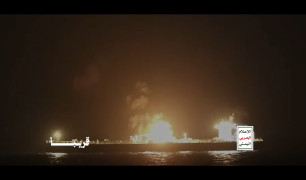مصادر سورية: أكثر من 15 آلية عسكرية ونحو 60 جنديا صهيونيا يتوغلون في قرية أوفانيا بريف القنيطرة الشمالي
أبو عبيدة: المقاومة الفلسطينية تمكنت بفضل الله ثم بدعم أحرار الأمة من الصمود الأسطوري في معركة "طوفان الأقصى" وكسر هيبة العدو الصهيوني وإفشال كل أهدافه المعلنة
أبو عبيدة: نؤكد بأن التهديدات والحصار والاعتداءات التي تتعرض لها الجمهورية الإسلامية هي بسبب وقوفها إلى جانب شعبنا الفلسطيني ودعمها المباشر والمعلن لمقاومته الباسلة
أبو عبيدة: التهديدات التي تتعرض لها الجمهورية الإسلامية اليوم وما سبقها من اعتداءات وحصار هي محاولة يائسة للانتقام من شعبِها العظيم وقيادتِها المقاومة
أبو عبيدة: القوات المسلحة الإيرانية والحرس الثوري قادرون بعون الله على صد العدوان وممارسة حقهِم الطبيعي والمشروع في الدفاع عن النفس وتسديد الضربات القاسية للمعتدين
أبو عبيدة: نُعبّرُ عن ثقتنا بعزم وصلابة القوات المسلحة الإيرانية والحرس الثوري الذين لقنوا العدو الصهيوني دروسا خلال معركة "الوعد الصادق 3"
أبو عبيدة: نعتبر أي عدوان على الجمهورية الإسلامية وشعبِها بلطجة مرفوضة تهدف إلى التدخل في شؤونها الداخلية ومحاولة فرض وقائع على الأرض بالقوة الغاشمة
أبو عبيدة: نعتبر أي عدوان على الجمهورية الإسلامية وشعبِها الشقيق عدوانا على أمتنا الإسلامية وتعديا إجراميا على سيادة دولة إسلامية مقاوِمة
الناطق العسكري باسم كتائب القسام أبو عبيدة: نُعلن تضامننا وأبناء شعبِنا مع إيران قيادة وحكومةً وشعبا
السيد القائد: إن واجب الأمة الإسلامية أن تكون أكثر وعيًا واهتماما بنصرة الشعب الفلسطيني ومجاهديه والوقوف ضد العدو الإسرائيلي وشريكه الأمريكي











































































